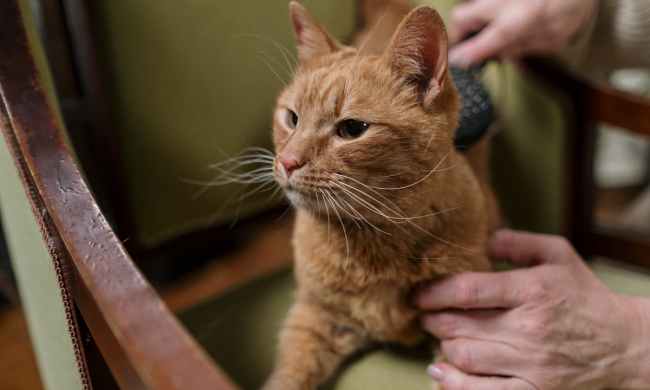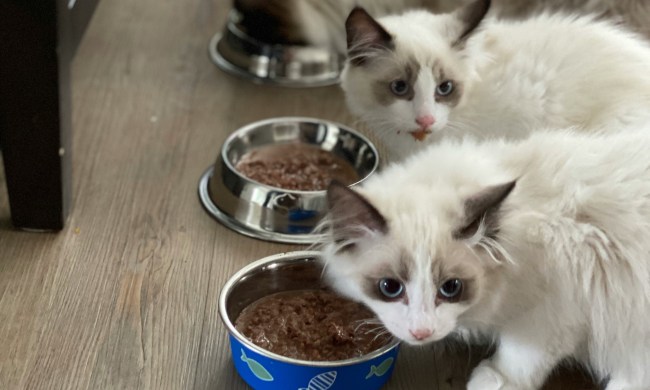Every cat owner feels that their buddy is one of a kind — and every cat owner is right! No two kitties are the same, no matter how identical they may look on the outside. They each have their own preferences, experiences, cute names, and behaviors that shape the feline they are.
Sometimes, however, cats look different on the outside, too. In fact, one adorable internet-famous kitty named Monty became an icon for pets with facial differences after his adoring parents began sharing his story online. He has a chromosomal abnormality that caused him to be born without a nasal bridge, and many of his differences have caused fans to compare his condition to Down syndrome in humans. But can cats have Down syndrome?
Down syndrome cats may have similar chromosome differences and even similar characteristics to people with Down syndrome, but there’s more here than meets the eye. Let’s unpack the misconceptions about adorable cats with Down syndrome.
Can cats have Down syndrome?

Down syndrome cats like Monty are as adorable and charming as could be, but as veterinarians explain, they don’t truly have Down syndrome. True, the syndrome is also a chromosomal abnormality and other species may experience similar genetic differences, but Down syndrome itself can only occur in humans.
Down syndrome occurs when a person has an extra copy of chromosome 21, but other species have a different number and set of chromosomes than people. This makes it impossible for other species to experience the same genetic abnormality, although many species — including cats — can experience something similar.
Conditions in cats similar to Down syndrome

Though felines can’t have Down syndrome, they can experience similar problems and genetic abnormalities. One example is a condition that gives male cats an extra chromosome and controls their coat color. This often results in male cats having calico or tortoiseshell coloring, which is almost always exclusive to females.
Several other conditions can mimic many of the signs of Down syndrome in cats, including birth defects, cerebellar hypoplasia, neurological diseases, or even exposure to toxins by a pregnant mother cat. This is just one reason why it’s so important to visit a veterinarian if your cat’s health or behavior changes. They can help determine if anything is wrong.
Signs of a ‘Down syndrome cat’

Even though “Down syndrome cats” don’t actually have Down syndrome, they can experience many physical and functional abnormalities that affect their day-to-day lives. In Monty’s case, he has wide-set eyes and is missing a nasal bridge, but there are many symptoms that can tip off veterinarians when needed:
- Wide-set, upturned eyes
- Broad nose
- Small or strangely bent ears
- Decreased muscle tone
- Lethargy
- Difficulties walking or eating
- Heart problems
- Hearing and/or vision loss
- Difficulty urinating or defecating
Remember, these symptoms aren’t necessarily signs of a Down syndrome cat. All these issues can also be blamed on something else, so don’t jump to conclusions without proper testing.
What to do if a cat shows signs of feline Down syndrome

If you feel as if your cat is showing signs of illness or discomfort, it’s always a good idea to book a vet visit. However, looking different isn’t usually something to be concerned about. You should always bring a new cat to the vet to get a general picture of their health, so this can be a great time to look into any facial differences or odd behaviors. You may not get to the bottom of things at the first vet appointment, so try your best to be patient if you’re referred to a specialist for genetic testing. The waiting is often the hardest part, so be sure to keep living your life in the meantime.
Caring for a cat with chromosomal abnormalities can be hard to prepare for. Many kitties with these differences lead completely normal lives, while others need veterinary assistance for complications like hearing loss or gastrointestinal issues. Only your cat’s veterinarian can determine the kind of treatment your feline friend will need (if they need any at all), so it’s important that cats with genetic abnormalities become established with a veterinarian.
Monty, the feline superstar, may have spent a long time at the shelter in Norway due to his unusual appearance, but those very same features are what made his forever family fall in love with him. He is thriving with a few vet appointments and a lot of love, and we’re happy to report that most “Down syndrome cats” have the very same experience! These sweethearts should never be looked over just because they are different. In fact, it’s another reason to love and appreciate them!




